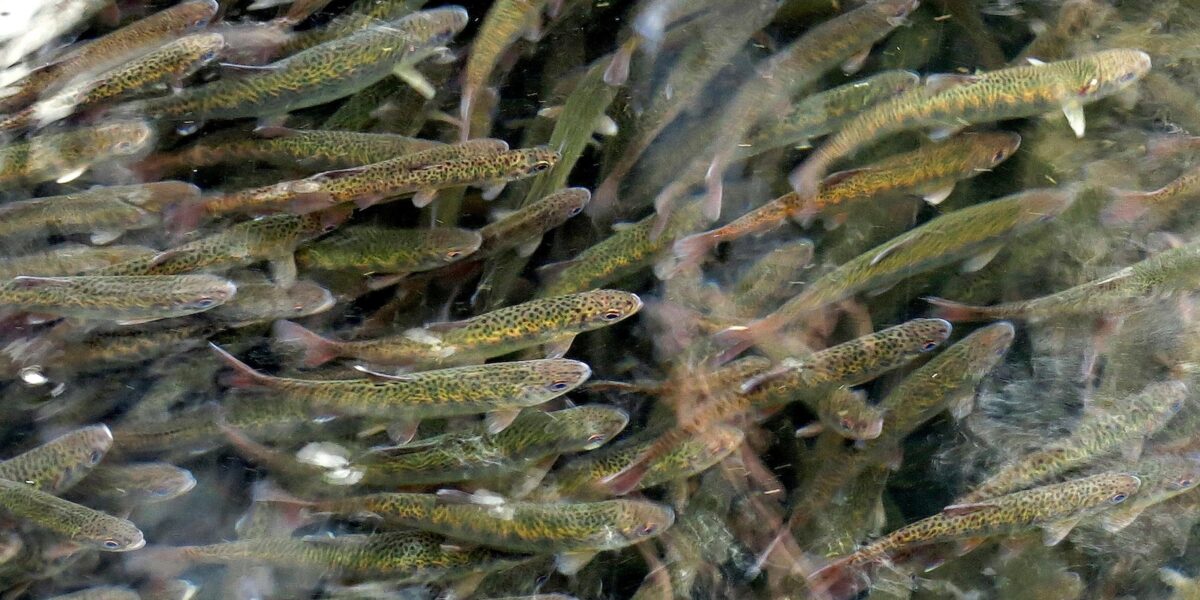BOISE, Idaho — The U.S. government will invest $240 million in salmon and steelhead hatcheries in the Pacific Northwest to boost declining fish populations and support the treaty-protected fishing rights of Native American tribes, officials announced Thursday.
The departments of Commerce and the Interior said there will be an initial $54 million for hatchery maintenance and modernization made available to 27 tribes in the region, which includes Oregon, Washington, Idaho and Alaska.
The hatcheries “produce the salmon that tribes need to live,” said Jennifer Quan, the regional administrator for NOAA Fisheries West Coast Region. “We are talking about food for the tribes and supporting their culture and their spirituality.”
Some of the facilities are on the brink of failure, Quan said, with a backlog of deferred maintenance that has a cost estimated at more than $1 billion.
“For instance, the roof of the Makah Tribe’s Stony Creek facility is literally a tarp. The Lummi Nation Skookum Hatchery is the only hatchery that raises spring Chinook salmon native to the recovery of our Puget Sound Chinook Salmon,” and it is falling down, Quan said.
Lisa Wilson, secretary of the Lummi Indian Business Council, said salmon are as important as the air they breathe, their health and their way of life. She thanked everyone involved in securing “this historic funding.”
“Hatchery fish are Treaty fish and play a vital role in the survival of our natural-origin populations while also providing salmon for our subsistence and ceremonies,” she said in a statement. “If it weren’t for the hatcheries and the Tribes, nobody would be fishing.”
The Columbia River Basin was once the world’s greatest salmon-producing river system, with at least 16 stocks of salmon and steelhead. Today, four are extinct and seven are listed under the Endangered Species Act. Salmon are a key part of the ecosystem, and another endangered Northwest species, a population of killer whales, depend on Chinook salmon for food.
Salmon are born in rivers and migrate long distances downstream to the ocean, where they spend most of their adult lives. They then make the difficult trip back upstream to their birthplace to spawn and die.
Columbia Basin dams have played a major part in devastating the wild fish runs, cutting off access to upstream habitat, slowing the water and sometimes allowing it to warm to temperatures that are fatal for fish.
For decades, state, federal and tribal governments have tried to supplement declining fish populations by building hatcheries to breed and hatch salmon that are later released into the wild. But multiple studies have shown that hatchery programs frequently have negative impacts on wild fish, in part by reducing genetic diversity and by increasing competition for food.
Quan acknowledged the hatcheries “come with risks” but said they can be managed to produce additional fish for harvest and even to help restore populations while minimizing risks to wild fish.
“Hatcheries have been around for a long time, and we’ve seen the damage that they can do,” Quan said.
Still the programs have gone through a course correction in recent years, following genetic management plans and the principles established by scientific review groups, she said. “We are in a different place now.”
It will take habitat restoration, improved water quality, adjustments to harvest and other steps if salmon are going to recover, but so far society has not been willing to make the needed changes for that to happen, she said. Add in the impacts of climate change, and the calculus of bad and good hatchery impacts changes further.
“We need to start having a conversation about hatcheries and how they are going to be an important adaptation tool for us moving forward,” Quan said.
Greg Ruggerone, a salmon research scientist with Natural Resources Consultants Inc. in Seattle, said the key is to determine how to better harvest hatchery salmon from rivers without harming the wild salmon that are making the same trek to spawning grounds. Robust harvests of hatchery fish will help ensure that the federal government is meeting its treaty obligations to the tribes, while reducing competition for wild fish, Ruggerone said.
“A big purpose of the hatcheries in the Pacific Northwest is to provide for harvest — especially harvest for the tribes — so there is a big opportunity if we can figure out how to harvest without harming wild salmon,” Ruggerone said.
Every hatchery in the Columbia River basin was built to mitigate the effects of the hydropower dams built in the region, said Becky Johnson, the production division director for the Nez Perce Tribe’s Department of Fisheries Resource Management.
Most were built in the 1960s, 1970s or earlier, she said.
“I’m super excited about this opportunity. Tribal and non-tribal people benefit from them — more salmon coming back to the basin means more salmon for everyone,” Johnson said. “It’s critical that we have fish and that the tribal people have food. Tribal members will tell you they’re fighting hard to continue to hang on to fish, and they’re never going to stop that fight.”


